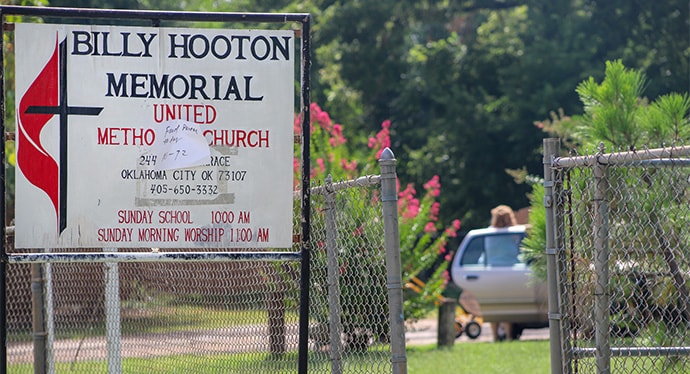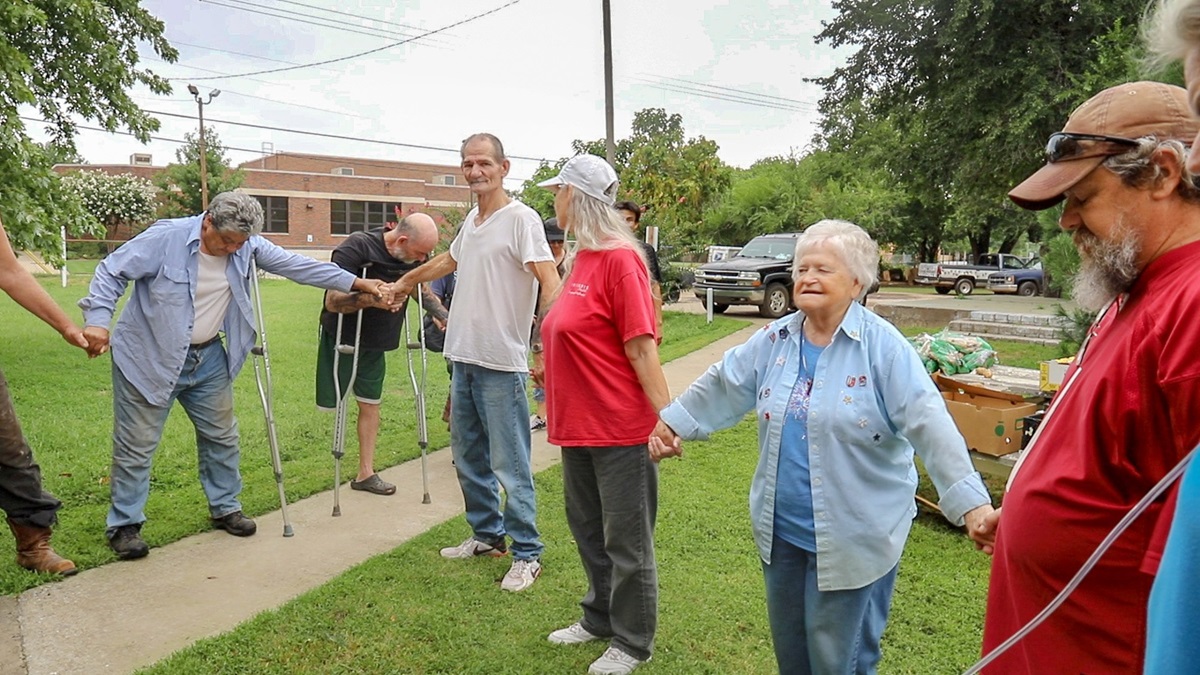On the third Saturday every month, a handwritten note on the Billy Hooton United Methodist Church’s front sign reads, “Food Pantry today.”
The locals, who arrive early on Aug. 24, already know what day it is.
“I come every time the door is open,” said Curtis McBride of Oklahoma City. “It’s very important. I draw a check; you know, by the time you pay your rent and your bills, you broke. You are lucky to buy groceries.”
The food bank ministry began nearly 30 years ago. Each month, the Oklahoma Food Bank delivers a truckload of food to the Native American church.
The frozen food goes into the freezers located in a storage closet in the front of the sanctuary. The fresh produce goes in the open space next to the pulpit. Dry goods fill the remaining rooms and line the hallways.
How to help
Donations to support the Billy Hooton Food Bank ministry can be made online at www.umc-oimc.org/give-online or through the Oklahoma Indian Missionary Conference office at 602 SW 35th St., Oklahoma City, OK 73109.
“We are thrilled with what we have here now,” said Alfreda Hibbard, a church member, as she walks around the packed sanctuary. “We have some really nice veggies this time: onions, potatoes, bananas, apples and grapes.”
Hibbard, 81, has worshipped in the makeshift food storage space since she was a young girl. She recalls that the church was not always a Native church.
When the church moved to the Oklahoma Indian Missionary Conference, Hibbard was undeterred by the fact that she is not Native American. She was already a member; she was married in the church and she planned to stay.
The congregation has become very small with the passing of time and church members. However, a handful of elderly women refuse to let the food ministry go because it reaches so many families in the community.
“We service 60 to 80 families monthly,” Hibbard said.
In the heyday of the food program, she recalls, a donor would put money into their food bank account, number 721. With money in their account, the church members were able to place orders in addition to what arrived in the trucks.
“There would not be a parking space in the lot, and hundreds of people were lined up because when we have money in our account, we are able to purchase higher-quality foods such as lamb, buffalo, a wide variety of canned goods and fresh produce.”

A handwritten note placed on the front sign of Billy Hooton United Methodist Church in the Oklahoma Indian Missionary Conference lets participants know when food will be distributed. Photo by Ginny Underwood, UM News.
The meat items this week include beef jerky in two forms, shredded or chunks, as well as fish filets, chicken breasts and small steaks.
“Sometimes, we don’t have enough people to help,” said Marie Sensibaugh, another church member. “Then, the Lord just brings people in and they start to help each other. That’s what we are here for, to help each other.”
The Rev. David Wilson, Oklahoma Indian Missionary Conference superintendent, said the women at Billy Hooton United Methodist Church “are definitely faith in action.
Subscribe to our
e-newsletter
“They do amazing things with very little resources,” he said.
Wilson said that sometimes the produce or milk have quick expiration dates and the women will jump in their cars or go door to door to deliver the goods to people who can use it in the nearby area.
Throughout the week, church members sort and prepare boxes with the dry goods. The boxes are stacked in the church reception area. On Saturday mornings, the ladies add fresh produce and frozen foods to the boxes.
“I thank God for places like this to help people,” said participant Gary McBride, who came from Oklahoma City with his brother. “There’s all kind of people out here that need help to get up on their feet and to feed their families.”
Church members also have begun a partnership with Mark Twain Elementary School located directly across from the church. In the past, they have provided meals for children, school supplies and Christmas care packages.
Underwood is a communication consultant with ties to the Oklahoma Indian Missionary Conference. She is a member of the Comanche Nation of Oklahoma.
News media contact: Vicki Brown at 615-742-5470 or newsdesk@umcom.org. To read more United Methodist news, subscribe to the free Daily or Weekly Digests.
Like what you're reading? Support the ministry of UM News! Your support ensures the latest denominational news, dynamic stories and informative articles will continue to connect our global community. Make a tax-deductible donation at ResourceUMC.org/GiveUMCom.




